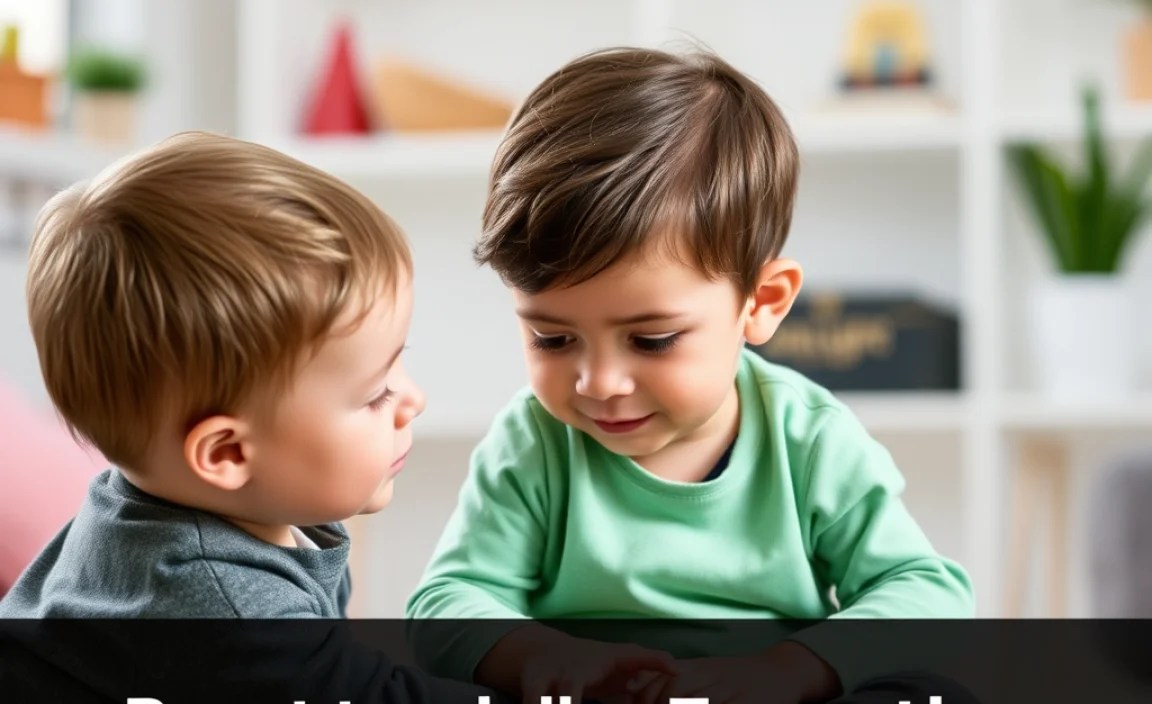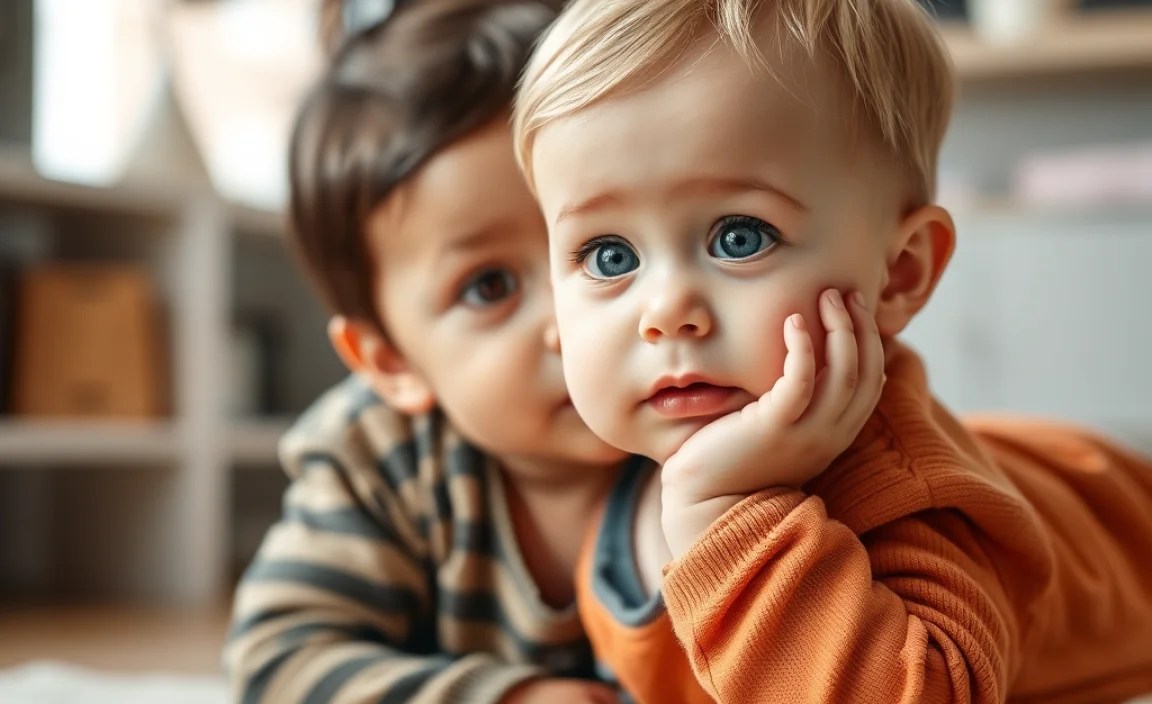Have you ever watched a toddler give their toy to a crying friend? This simple act shows the start of empathy. But how exactly do toddlers develop empathy? It’s an exciting process that begins early in life. Toddlers start to understand feelings and learn how to care for others’ emotions. Let’s dive into how this amazing journey unfolds.
At A Glance
Key Takeaways
- Empathy begins in toddlers around 18-24 months.
- Toddlers learn empathy by observing parents and peers.
- Toddler empathy development helps with social skills.
- Role-playing games can foster empathy in toddlers.
- Positive reinforcement encourages empathetic behavior.
Understanding Toddler Empathy Development

Toddlers start showing empathy around 18 to 24 months. They begin to notice others’ emotions. This is when they might hug a crying friend or look concerned when someone is upset. It’s important to nurture these early signs. Parents can do this by modeling empathetic behavior. For instance, they can show how to comfort someone or talk about feelings. This helps toddlers learn empathy from what they see and hear every day.
- Empathy starts in toddler years.
- Parents are role models for empathy.
- Toddlers notice emotions around them.
- Talking about feelings is helpful.
- Early empathy boosts social skills.
- Empathy involves understanding others’ needs.
Building empathy in toddlers takes time and patience. Parents and caregivers play a key role. By being attentive to a child’s emotional growth, they can guide toddlers in understanding and responding to emotions. Encouraging toddlers to express their own feelings is also essential. This helps them relate to others better in the future.
Fun Fact: Did you know that empathy can improve a toddler’s friendships?
Why Is Empathy Important?
Empathy helps us connect with others. But why is it so important? Imagine feeling sad and a friend comes to comfort you. Doesn’t that make you feel better? That’s what empathy does. It builds bonds and understanding between people. For toddlers, empathy means they can play better with friends and solve problems together. It helps them grow into kind, caring adults.
How Do Toddlers Show Empathy?
Toddlers might not talk much, but they show empathy in other ways. Have you seen a toddler pat a friend’s back or share a toy? They might also look concerned when a friend is upset. These are signs of empathy. Toddlers learn from watching people around them. They see how to be kind and caring. Even a simple smile can show empathy.
What Role Do Parents Play?
Parents have a big job when teaching empathy. They are the first teachers for their toddlers. By showing empathy themselves, they set an example. If a parent shows kindness, the toddler often copies this behavior. Parents can also talk about feelings. They can ask questions like, “How do you think your friend feels?” This helps the toddler understand emotions better.
Activities That Foster Empathy

There are many fun activities to help develop empathy in toddlers. Simple pretend play is a great start. Play house or family with dolls or stuffed animals. You can create scenarios where characters need help or comfort. Reading stories about emotions is another useful activity. Books with pictures and stories about feelings can spark conversations about empathy.
- Pretend play encourages empathy.
- Reading emotional stories helps understanding.
- Role-playing situations build empathy skills.
- Games with turn-taking teach patience.
- Discussing emotions is beneficial.
Interactive games like “Simon Says” can also teach empathy. When toddlers play, they learn to listen and respond to others’ emotions. These activities not only build empathy but also make learning fun. Sharing emotions during playtime helps toddlers understand and care for others.
Fun Fact: Reading stories about feelings improves empathy by 30%!
Pretend Play and Empathy
Pretend play is like stepping into someone else’s shoes. Have you ever pretended to be a doctor or a chef? In pretend play, toddlers imagine they are someone else. This helps them understand different roles and emotions. If they pretend to be a doctor, they learn how to care for a patient. Pretend play lets them explore feelings in a safe environment.
Reading Stories About Emotions
Books can take us to many places. They can also teach us about feelings. Imagine reading a story about a sad puppy. How do you think the puppy feels? What would make the puppy happy? By discussing these questions, toddlers learn to think about others’ feelings. Reading stories with emotional themes encourages empathy in a fun way.
Role-Playing Games
Role-playing games are exciting and educational for toddlers. In these games, toddlers act out different roles, like being a teacher or a parent. They learn how those roles feel and what they mean. By acting out different scenarios, toddlers understand how to respond to different emotions. It’s a playful way to learn important social skills.
Encouraging Empathetic Behavior

Encouraging empathy is crucial in toddler development. One method is praise. When toddlers show care, praise them. Say, “Great job sharing your toy!” This positive reinforcement makes them want to repeat the behavior. Another way is to talk about feelings. Ask questions like, “Why do you think your friend is sad?” These discussions help toddlers think about emotions.
- Praise encourages empathy.
- Discussing feelings is beneficial.
- Modeling behavior helps learning.
- Use positive words for guidance.
- Empathy grows with practice.
Encouraging empathy in toddlers takes time. But the results are worth it. With guidance and practice, toddlers can become more empathetic. This helps them make friends and understand the world better. Parents and caregivers should be patient and consistent in their efforts.
Fun Fact: Praising toddlers for empathy boosts their confidence!
Praise and Rewards
Everyone loves to be praised for their actions, right? Toddlers are no different. When they show empathy, like sharing a toy or comforting a friend, they should hear positive words. This positive feedback encourages them to continue being empathetic. It makes them feel good and motivates them to repeat the behavior.
Discussing Emotions
Talking about emotions helps toddlers understand them better. Imagine if you could talk about how you feel every day. Parents can ask questions like, “How did that make you feel?” or “What do you think your friend felt?” These questions make toddlers reflect and learn about emotions. The more they understand, the better they can empathize with others.
Modeling Empathetic Behavior
Toddlers learn by watching. If they see parents acting kindly, they’ll likely do the same. Parents can show empathy in everyday situations. For example, helping someone in need or comforting a sad person. Toddlers notice these actions and learn that showing empathy is important. They start to imitate these behaviors, growing their understanding of empathy.
Challenges in Developing Empathy

Developing empathy in toddlers can face challenges. One challenge is their limited understanding of emotions. Toddlers are just learning about feelings. They might not understand complex emotions like jealousy or embarrassment. Another challenge is their focus on self. Toddlers are naturally self-centered, so understanding others’ feelings takes practice.
- Understanding emotions is difficult for toddlers.
- Self-centered nature presents challenges.
- Limited vocabulary can hinder expression.
- Inconsistent guidance affects learning.
- Empathy requires patience and practice.
Addressing these challenges requires patience and consistency. Parents should provide simple and clear explanations of emotions. They should also encourage toddlers to express feelings freely. With time and support, toddlers can overcome these challenges and develop strong empathy skills.
Fun Fact: Toddlers can understand basic emotions by age three!
Understanding Complex Emotions
Toddlers understand basic emotions like happy or sad. But what about complex ones like jealousy? These take more time to learn. Parents can help by explaining these emotions in simple terms. For example, “Jealousy is when you want something someone else has.” This helps toddlers recognize and understand complex feelings gradually.
The Self-Centered Nature of Toddlers
Toddlers often think of themselves first. Can you blame them? They’re still learning about the world. This self-focus can make empathy challenging. Parents can gently guide toddlers to consider others. For instance, they can ask, “How would you feel if that happened to you?” This helps shift focus from self to others.
Improving Vocabulary for Better Expression
Words help us express how we feel. Toddlers have a limited vocabulary, so expressing emotions can be tough. Parents can introduce new words and explain their meanings. For example, “Frustrated means feeling upset because something didn’t go as planned.” This helps toddlers articulate their feelings better, leading to improved empathy.
Conclusion
Empathy is a vital skill that begins in toddlerhood. Toddler empathy development helps children understand and care for others. Parents play a key role by modeling empathetic behavior and encouraging open discussions about feelings. With time, patience, and guidance, toddlers can grow into empathetic individuals, ready to connect with the world around them.
FAQs
Question: When do toddlers start developing empathy?
Answer: Toddlers begin to develop empathy around 18-24 months. They start recognizing others’ emotions and try to comfort them. This early stage of empathy is important for their social and emotional growth.
Question: How can parents encourage empathy in toddlers?
Answer: Parents can encourage empathy by modeling empathetic behavior. They can praise toddlers for showing care and discuss emotions openly. Engaging in role-playing games and reading stories about feelings also helps nurture empathy.
Question: What activities can help toddlers develop empathy?
Answer: Activities like pretend play, reading emotional stories, and role-playing games are effective. These activities help toddlers understand emotions and practice empathy in a fun and engaging way.
Question: Why is empathy important for toddlers?
Answer: Empathy helps toddlers connect with peers and understand others’ feelings. It improves their social skills and helps them form strong friendships. Empathy also lays the foundation for becoming kind, caring adults.
Question: What challenges do toddlers face in developing empathy?
Answer: Toddlers face challenges like limited emotions understanding and self-centered nature. They have a limited vocabulary, making it hard to express feelings. With guidance, they can overcome these challenges and develop empathy.
Question: How does toddler empathy development impact future growth?
Answer: Toddler empathy development impacts future social and emotional growth positively. It helps toddlers form healthy relationships and understand others better. This foundation is crucial for their development into empathetic adults.